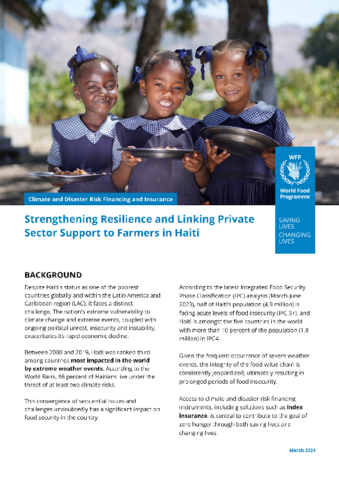
Haiti, one of the poorest countries globally and within the Latin America and Caribbean region (LAC) is extremely vulnerable to climate change and extreme events, which, when coupled with ongoing political unrest, insecurity and instability, exacerbates its rapid economic decline. This factsheet provides an overview of WFP supported risk financing instruments in the country and the interventions aimed at promoting effective climate change adaptation, both at the local and national levels. WFP continues to work on scaling risk financing instruments in the country at the national and micro levels to enable individuals and communities to safeguard their investments against increasing frequency and severity of climate related disasters.
